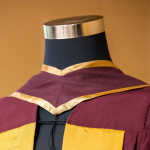Honorary Degrees
Updates and Contact Information
Nomination Overview
There are three general categories of people upon whom the University confers honorary degrees:
- individuals who are distinguished scholars or who have made outstanding contributions to the creative or performing arts;
- individuals who have distinguished reputations in the area of public service at the national or international levels, or who have had long and distinguished careers in professions such as law, or as educators, for example; and
- individuals who have made important and noteworthy contributions to McMaster University and/or the local community.
Read the Guidelines for the Awarding of Honorary Degrees (Senate Policy) for full details.
Typically, one honorary degree is granted at each Convocation ceremony, although this varies depending on the circumstances and the honorary degree recipient. Although it is convention to award an honorary degree at each convocation, there may be times when the University elects not to do so at one or more Convocation ceremony. In rare cases, if there are a relatively large number of individuals who are well-qualified to receive honorary degrees before the Committee on Honorary Degrees, then the Committee might recommend that more than one honorary degree be conferred at a particular Convocation.
At this time, the University confers the following honorary degrees:
- Doctor of Letters (D.Litt.) awarded for outstanding achievement in the humanities, or in the performing or fine arts
- Doctor of Science (D.Sc.) awarded for outstanding achievement in the pure and applied sciences, usually through research
- Doctor of Laws (LL.D.) awarded for outstanding academic achievement in the Social Sciences and/or for significant community contributions at the local, national, or international levels
Complete the PDF form online and email it to honorary.degrees@mcmaster.ca. Before doing so, you will need the following information:
- Nominee’s full name, mailing address, telephone number, and email address
- Career Summary/Citation: a summary of the nominee’s accomplishments, the significance of their achievements, and the impact of such on the local, national or international community (~250 words)
- Personal statement of support from nominator
- Contact information of the nominator
- Letters of support and/or information to support the nominee’s nomination
- Nominee’s Curriculum Vitae/Résumé
Nominations are accepted throughout the year for consideration by the Senate Committee on Honorary Degrees. However, to ensure your nomination is considered for a specific set of convocation dates, it must be submitted by the second Monday in September (for the following spring ceremonies) or by the second Monday in January (for the following fall ceremonies).


